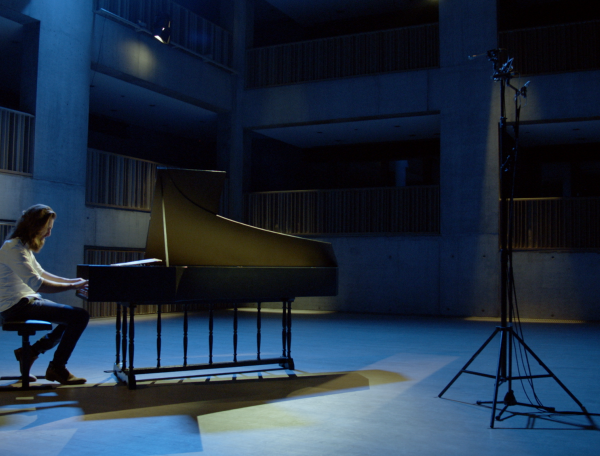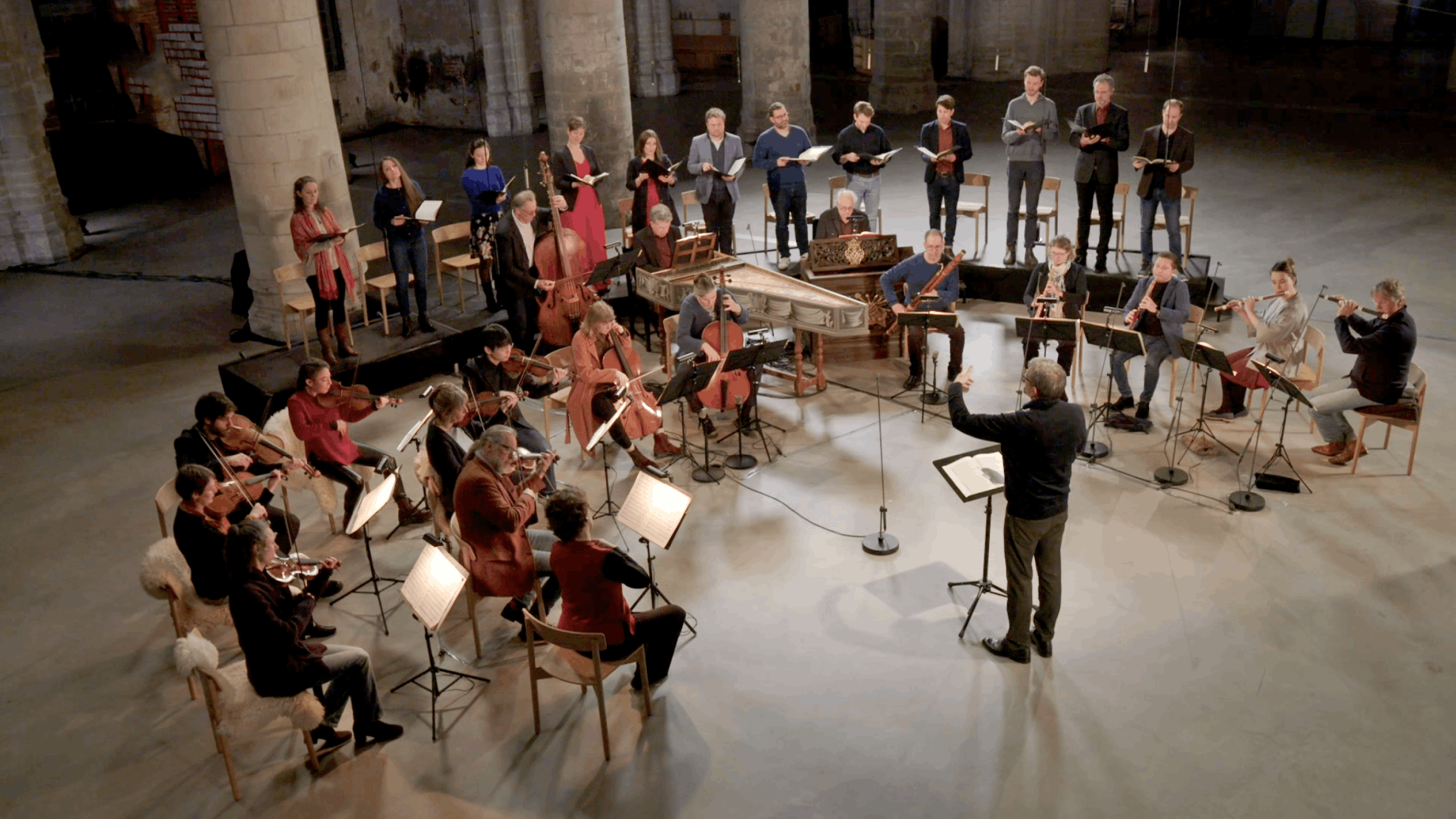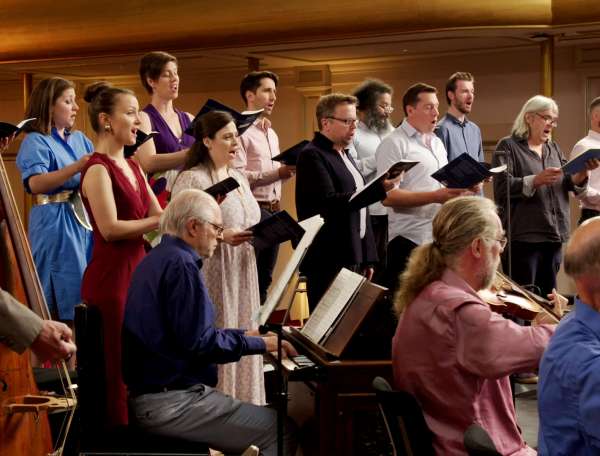

Es ist dir gesagt, Mensch, was gut ist
BWV 1080 performed by the Netherlands Bach Society
conducted by Hans-Christoph Rademann
Grote Kerk Veere
Behind the music
Cheerful obedience
Bach maybe found some satisfaction in this cantata
The words of the opening chorus of this cantata are imbued with Old Testament strictness. God has decreed what he demands of you: keeping to his word, being humble and practising love. So Bach – after a proclamation sung three times – writes a fugue, as he often does for texts about rules and laws. But he interrupts the fugue about the fact that God has spoken, interjecting the word ‘namely’ (nämlich), sung together, after which begins the enumeration of what God actually said. In this way, Bach emphasises cheerful and light-hearted obedience in this opening chorus, rather than sternness.
Bach himself had a reputation for not being a paragon of cheerful obedience at all. In 1717, he even spent a month in prison ‘due to his obstinate declaration’ (he had accepted a new job without permission). Later, this reputation also followed him to Leipzig. In 1730, part of his salary was docked ‘because the cantor is incorrigible’ (weil der Cantor incorrigibel sey). That may have been a moment for Bach to reflect on the tenor aria from this cantata, where we hear the warning: ‘obedience is rewarded: torment and scorn threaten if you transgress’.
In that case, he probably found some satisfaction in the second part of the cantata, which opens with a bass aria where Christ gives the false prophets a heated dressing-down (the text comes from the Gospel according to St Matthew): I never knew you: depart from me! The concept of obedience is thus refined: not everyone who says they obey God actually does so. In the apparently lenient closing aria, whose character is defined by a flute moving nobly forward, we also hear that those who merely pay lip service to God will “burn for all eternity”.
In retrospect, the customary “SDG” (soli Deo gloria) that Bach notated at the end of BWV 45 seems almost like a response to his earthly troublemakers: glory to God alone.
- BWV
- 45
- Title
- Es ist dir gesagt, Mensch, was gut ist
- Instrument
- alto, bass, tenor
- Genre
- cantatas
- Year
- 1726
- City
- Leipzig
- Occasion
- Eighth Sunday after Trinity
- First performance
- 11 August 1726
With support from
Extra videos
Vocal texts
Original
1. Chor
Es ist dir gesagt, Mensch, was gut ist
und was der Herr von dir fordert,
nämlich: Gottes Wort halten
und Liebe üben
und demütig sein vor deinem Gott.
2. Rezitativ (Tenor)
Der Höchste läßt mich seinen Willen wissen
und was ihm wohlgefällt;
er hat sein Wort zur Richtschnur dargestellt,
wornach mein Fuß soll sein geflissen
allzeit einherzugehn
mit Furcht, mit Demut und mit Liebe
als Proben des Gehorsams, den ich übe,
um als ein treuer Knecht dereinsten zu bestehn.
3. Arie (Tenor)
Weiß ich Gottes Rechte,
was ists, das mir helfen kann,
wenn er mir als seinem Knechte
fordert scharfe Rechnung an?
Seele! denke dich zu retten,
auf Gehorsam folget Lohn;
Qual und Hohn
drohet deinem Übertreten!
4. Arioso (Bass)
Es werden viele zu mir sagen an jenem Tage:
Herr, haben wir nicht
in deinem Namen geweissaget,
haben wir nicht in deinem Namen
Teufel ausgetrieben,
haben wir nicht in deinem Namen
viel Taten getan?
Denn werde ich ihnen bekennen:
Ich habe euch noch nie erkannt,
weichet alle von mir, ihr Übeltäter!
5. Arie (Alt)
Wer Gott bekennt
aus wahrem Herzensgrund,
den will er auch bekennen.
Denn der muß ewig brennen,
der einzig mit dem Mund
ihn Herren nennt.
6. Rezitativ (Alt)
So wird denn Herz und Mund
selbst von mir Richter sein,
und Gott will mir den Lohn
nach meinem Sinn erteilen:
Trifft nun mein Wandel
nicht nach seinen Worten ein,
wer will hernach der Seelen Schaden heilen?
Was mach ich mir denn selber Hindernis?
Des Herren Wille muß geschehen,
doch ist sein Beistand auch gewiß,
daß er sein Werk durch mich mög wohl vollendet sehen.
7. Choral
Gib, daß ich tu mit Fleiß,
was mir zu tun gebühret,
worzu mich dein Befehl
in meinem Stande führet!
Gib, daß ichs tue bald,
zu der Zeit, da ich soll;
und wenn ichs tu, so gib,
daß es gerate wohl!
Translation
1. Chorus
He hath showed thee, O man, what is good;
and what doth the Lord require of thee,
but to do justly,
and to love mercy,
and to walk humbly with thy God?
2. Recitative (Tenor)
The Highest lets me know His will
and what pleases Him well;
He gave His Word as a guide for life,
which I should diligently follow
at all times
with fear, humility and love,
as a test of the obedience which I practise,
so that I might prove to be a faithful servant.
3. Aria (Tenor)
I know God’s true justice,
what it is which can help me,
when He demands strict reckoning
of me, as His servant.
Soul, be of a mind to save yourself,
obedience is rewarded:
torment and scorn
threaten if you transgress!
4. Arioso (Bass)
Many will say to me in that day,
Lord, have we
not prophesied in Thy name?
and in Thy name
have cast out devils?
and in Thy name
done many wonderful works?
And then will I profess unto them,
I never knew you:
depart from me, ye that work iniquity.
5. Aria (Alto)
Whosoever acknowledges God
from the very depths of his heart,
God will acknowledge also.
For he shall burn forever
who merely with his mouth
calls Him Lord.
6. Recitative (Alto)
So shall my heart and mouth
be my judges,
and God shall reward me
as I think fit:
if my conduct does not
fulfil His words,
who will heal henceforth my soul’s harm?
Why do I hinder myself?
The Lord’s will must come to pass,
but His support is also sure,
that He might see His work accomplished through me.
7. Chorale
Grant that I do with zeal
what it befits me to do,
that which Thou dost order me,
according to my station!
Grant that I do it soon,
at the time which I ought;
and when I do it, then grant
that it may prosper well!
Credits
-
- Release date
- 18 January 2024
-
- Recording date
- 9 March 2023
-
- Location
- Grote Kerk Veere
-
- Conductor
- Hans-Christoph Rademann
-
- Alto
- Franz Vitzthum
-
- Tenor
- Guy Cutting
-
- Bass
- Tobias Berndt
-
- Ripieno soprano
- Marta Paklar, Lauren Armishaw, Kristen Witmer
-
- Ripieno alto
- Bernadett Nagy, Sofia Gvirts
-
- Ripieno tenor
- Adriaan de Koster, João Moreira
-
- Ripieno bass
- Donald Bentvelsen, Jaap van der Wel
-
- Violin 1
- Cecilia Bernardini, Pieter Affourtit, Anneke van Haaften
-
- Violin 2
- Lidewij van der Voort, Kano Imada, Mayumi Sargent Harada
-
- Viola
- Femke Huizinga, Ivan Jorge Saez Schwartz
-
- Cello
- Lucia Swarts, Anna Litvinenko
-
- Double bass
- Robert Franenberg
-
- Traverso
- Marten Root, Aysha Wills
-
- Oboe
- Rodrigo Lopez Paz, Katharina Verhaar
-
- Bassoon
- Benny Aghassi
-
- Harpsichord
- Siebe Henstra
-
- Organ
- Leo van Doeselaar
-
- Director and editor
- Bas Wielenga
-
- Music recording
- Guido Tichelman, Pim van der Lee, Lilita Dunska
-
- Music edit and mix
- Guido Tichelman
-
- Camera
- Martijn Struijf, Wesley Schipper, Jesper Blok, Bjorn Tiebout, Glenn van Eerden
-
- Lights
- Ernst-Jan Thieme, Martijn Schroeber, Jordi Kooij, Joey Marcoux
-
- Stylist
- Ellen Julianus
-
- Assistant director
- Ferenc Soeteman
-
- Assistant music recording
- Marloes Biermans
-
- Producer film
- Laura Jonker
-
- Producer concert
- Imke Deters
-
- With support from
- MWH4impact
Discover
Help us to complete All of Bach
There are still many recordings to be made before the whole of Bach’s oeuvre is online. And we can’t complete the task without the financial support of our patrons. Please help us to complete the musical heritage of Bach, by supporting us with a donation!

